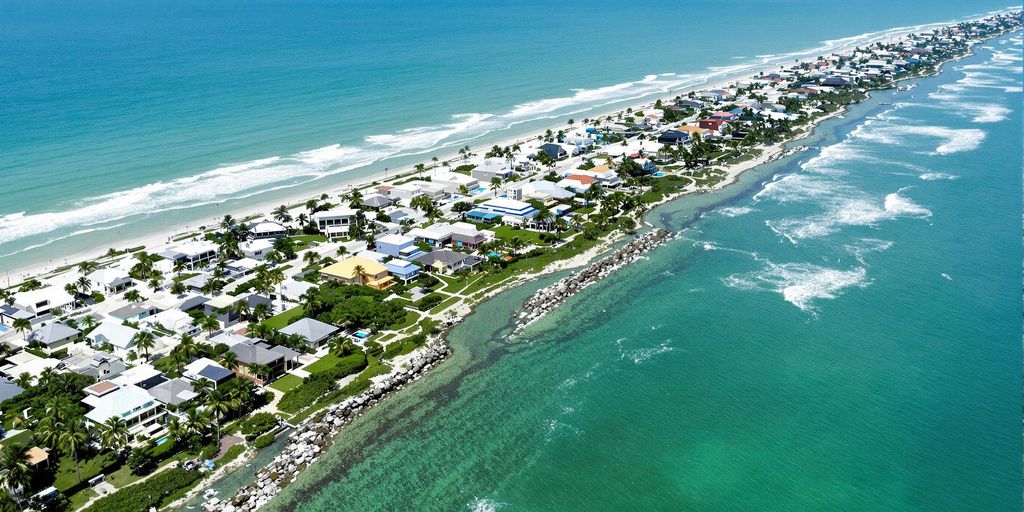Florida’s housing market is experiencing a significant shift, moving from a seller’s to a buyer’s market. This change is characterized by a surge in housing inventory, moderating median sales prices, and a notable decrease in demand. Several major metropolitan areas across the state are particularly affected, signaling a broader market correction.
Florida’s Housing Market Cools Down
Florida’s real estate landscape is undergoing a substantial transformation, marked by an increase in available homes and a stabilization, or even decrease, in prices. This trend is evident across both single-family homes and condo-townhouse units. The shift is largely attributed to a decrease in buyer demand, which has withered after a period of rapid price escalation.
Key Takeaways
- Increased Inventory: Active listings of existing homes for sale in Florida surged by 32% year-over-year in May, reaching 181,822 listings. This represents a quadrupling of inventory since late 2022.
- Moderating Prices: The statewide median sales price for single-family homes in February remained flat at $415,000 compared to the previous year, while condo-townhouse units saw a 3.1% decrease to $315,000.
- Shift to Buyer’s Market: Single-family home inventory is now at a 5.3-months’ supply, indicating a balanced market. Condo-townhouse inventory is at a 9.7-months’ supply, firmly placing it in a buyer’s market.
- Demand Destruction: The rapid price increases during the pandemic era led to demand destruction, as homes became unaffordable for many potential buyers.
Metro Areas Feeling the Shift
Several major Florida metropolitan areas are experiencing significant increases in active listings compared to pre-pandemic levels, indicating a substantial cooling of the market:
| Metro Area | Year-over-Year Increase (May) | Increase vs. May 2019 |
|---|---|---|
| Miami-Fort Lauderdale | 39% | 5% |
| Tampa-St. Petersburg | 31% | 40% |
| Orlando-Kissimmee | 39% | 42% |
| Cape Coral-Fort Myers | 36% | 36% |
| North Port-Sarasota | 31% | 36% |
| Jacksonville | 31% | 25% |
| Lakeland-Winter Haven | 25% | 80% |
Redfin’s report highlights that six of the top buyer’s markets in the country are in Florida, including Miami, West Palm Beach, Fort Lauderdale, Jacksonville, Tampa, and Orlando. This is due to the number of sellers significantly outpacing buyers.
Factors Contributing to the Market Shift
Several factors are contributing to the current state of Florida’s housing market:
- Affordability Breaking Point: Despite recent moderation, prices remain significantly higher than pre-pandemic levels. Coupled with higher interest rates, many potential buyers are priced out.
- Increased Inventory: As sales plunge, homes are sitting on the market longer, leading to a build-up of unsold inventory.
- Cooling Migration: The frantic pace of migration to Florida has slowed, and rising costs of living, including skyrocketing homeowner’s insurance, are making some reconsider.
- Investor Pullback: Higher interest rates and the prospect of falling prices have made real estate investments less attractive, reducing a key source of demand.
High-Risk Markets for Price Decline
According to Cotality (formerly CoreLogic) data from April 2025, five Florida housing markets are at a very high risk of experiencing a major price decline:
- Cape Coral, FL
- Lakeland, FL
- North Port, FL
- St. Petersburg, FL
- West Palm Beach, FL
These areas experienced rapid and potentially unsustainable price appreciation, making them more vulnerable to corrections as demand wanes and inventory rises. The market is adjusting to find a new equilibrium, favoring buyers and requiring sellers to adapt to the new conditions.
Sources
- Fla.’s Housing: Inventory Up, Median Prices Ease, Florida Realtors.
- Inventory of Homes for Sale in the Biggest Florida Metros Piles Up to Highest in Years as Demand Has Withered
| Wolf Street, Wolf Street. - Florida markets Miami, Tampa, Jacksonville lead top buyer’s markets: Report, wtsp.com.
- Housing Scorecard: Inventory rises across South Florida, South Florida Agent Magazine.
- 5 Popular Florida Housing Markets Are at High Risk of Price Crash, Norada Real Estate Investments.


